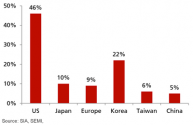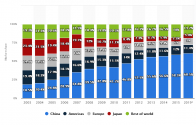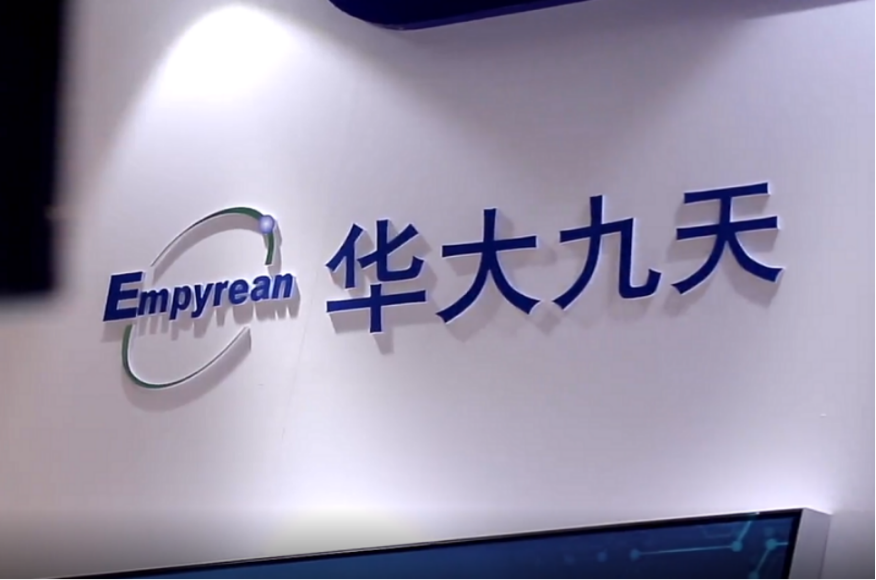You are using an out of date browser. It may not display this or other websites correctly.
You should upgrade or use an alternative browser.
You should upgrade or use an alternative browser.
Chinese semiconductor industry
- Thread starter Hendrik_2000
- Start date
- Status
- Not open for further replies.
Woe to be an American Corporation...lol They will get an exemption cause for Washington DC issuing permits is another layer for money making....lol And the gall of the Collective West to accuse others of systematic institutional corruption.
By
Follow
0

Applied Materials Inc. disclosed Wednesday that a widened ban on sales of certain tech to China will likely cost the chip-equipment manufacturer up to $1.1 billion in sales over six months.
Applied Materials executives expect a loss of $250 million to $550 million in sales in its fiscal fourth quarter because of Applied Materials said the ban could hurt first-quarter sales by roughly the same amount.
Shares declined 1.5% in after-hours trading following the announcement, after a 0.4% decline in the regular session to close at $76.01.
As a result, Applied Material executives revised their financial forecast for the fiscal fourth quarter. They now expect fiscal fourth-quarter earnings of $1.54 to $1.78 a share, compares to the prior forecast of $1.82 to $2.18 a share. The forecast includes a 23-cents-a-share charge for resulting inventory and remanufacturing costs.
The company also expects fourth-quarter revenue of $6.15 billion to $6.65 billion, down from its prior forecast of $6.25 billion to $7.05 billion.
Analysts surveyed by FactSet had estimated earnings of $2.01 a share on revenue of $6.67 billion for the fiscal fourth quarter. Analysts were expecting first-quarter revenue of $6.79 billion on average, according to FactSet.
Applied Materials shares have declined 51.7% so far this year, as . The S&P 500 index has declined 24.7% in that period, while the PHLX Semiconductor Index has dropped 44.3%.
Applied Materials could lose more than $1 billion in sales from China ban over six months
Last Updated: Oct. 13, 2022 at 7:55 a.m. ETFirst Published: Oct. 12, 2022 at 4:43 p.m. ETBy
Follow
0
Chip-equipment manufacturer says that up to $550 million in sales at risk quarterly from restrictions U.S. is putting into place for exports of high-performance semiconductors to China

Applied Materials Inc. makes equipment to manufacture semiconductors.
DAVID PAUL MORRIS/BLOOMBERGApplied Materials Inc. disclosed Wednesday that a widened ban on sales of certain tech to China will likely cost the chip-equipment manufacturer up to $1.1 billion in sales over six months.
Applied Materials executives expect a loss of $250 million to $550 million in sales in its fiscal fourth quarter because of Applied Materials said the ban could hurt first-quarter sales by roughly the same amount.
Shares declined 1.5% in after-hours trading following the announcement, after a 0.4% decline in the regular session to close at $76.01.
As a result, Applied Material executives revised their financial forecast for the fiscal fourth quarter. They now expect fiscal fourth-quarter earnings of $1.54 to $1.78 a share, compares to the prior forecast of $1.82 to $2.18 a share. The forecast includes a 23-cents-a-share charge for resulting inventory and remanufacturing costs.
The company also expects fourth-quarter revenue of $6.15 billion to $6.65 billion, down from its prior forecast of $6.25 billion to $7.05 billion.
Analysts surveyed by FactSet had estimated earnings of $2.01 a share on revenue of $6.67 billion for the fiscal fourth quarter. Analysts were expecting first-quarter revenue of $6.79 billion on average, according to FactSet.
Applied Materials shares have declined 51.7% so far this year, as . The S&P 500 index has declined 24.7% in that period, while the PHLX Semiconductor Index has dropped 44.3%.
What is the point of a new ban. It isn't like the US would ever allow its telecom companies from purchasing equipment from Huawei and ZTE to begin with. US should focus upon taking out old Huawei and ZTE equipment from its telecom companies. It is already costing 5 billions to rip and replace Huawei and ZTE gear and it doesn't look like it is anywhere near completed.
Deep down they must know that the backdoor thing is a myth. Why do they insist on suffering?
There is a phrase when you see someone doing some physical feat that says: "I got tired just watching this person"
If the US talk about splitting the monopoly that China has on rare earth between the US and their allies, they may get someone agreeing with them.
But when the US talk about splitting this:


Anyone who agree has to be checked in the head.
That is like Nvidia giving their market share to AMD by splitting its own costumer base . You know that the investors are going to eat Mr. Jensen sorry ass alive.
I know that the sense of frustration of Chinese executives should be brutal right now but I cannot even imagine the sense of frustration that this US executives should be feeling discussing this issues with this national security clowns. Babbling about "the duty", "China this China that", "decouple", "splitting the supply chain", "military", "they vs us", or things that they don't even have an idea what they are talking about, the frustration have to be absolutely in another level, they have to take a good doze of Valium before every reunion.
If the US talk about splitting the monopoly that China has on rare earth between the US and their allies, they may get someone agreeing with them.
But when the US talk about splitting this:


Anyone who agree has to be checked in the head.
That is like Nvidia giving their market share to AMD by splitting its own costumer base . You know that the investors are going to eat Mr. Jensen sorry ass alive.
Last edited:
Are you asking from a position of prior experience?Don't lie, were you abused as a child?
Not all US allies will go along with it. And there will be plenty of ways to circumvent it. Why are you so confident on what the US does? Is everything they do like 5D chess to you?
this song for U.S now: lonely... I'm Mr lonely
Unfortunately, I guess for AMAT and friends despite all of the operational dispersion they did with having the majority of their manufacturing done overseas (e.g. LAM Malaysia) wasn't enough in this case. I would wager a guess that AMAT and friends are probably held back by the IP behind their products which is probably heavily US origin or with heavy US contribution so the noose was just too tight for them, because moving patents offshore is challenging. Even if they move the IP to an offshore holding company, it doesn't change the contribution source, although it may save them some taxes lol. Interestingly enough, ASML can still ship DUVi scanners but just can't have US entities participate in any design, production or servicing. US patents typically only last between 15 (design) to 20 years (utilization) , so depending on when ASML filed those patents for the original DUVi (usually in early development, well before they started implementing it) its possible those patents expired and therefore, ASML could argue that there is no US specific IP behind their DUVi since the original product is now off-patent and the changes they have made to the newer models are based off non-US patents so legally speaking they have no US content in it assuming all parts, labor, servicing, etc are also non-US.Woe to be an American Corporation...lol They will get an exemption cause for Washington DC issuing permits is another layer for money making....lol And the gall of the Collective West to accuse others of systematic institutional corruption.
Applied Materials could lose more than $1 billion in sales from China ban over six months
Last Updated: Oct. 13, 2022 at 7:55 a.m. ETFirst Published: Oct. 12, 2022 at 4:43 p.m. ET
By
Follow
0
Chip-equipment manufacturer says that up to $550 million in sales at risk quarterly from restrictions U.S. is putting into place for exports of high-performance semiconductors to China

Applied Materials Inc. makes equipment to manufacture semiconductors.
DAVID PAUL MORRIS/BLOOMBERG
Applied Materials Inc. disclosed Wednesday that a widened ban on sales of certain tech to China will likely cost the chip-equipment manufacturer up to $1.1 billion in sales over six months.
Applied Materials executives expect a loss of $250 million to $550 million in sales in its fiscal fourth quarter because of Applied Materials said the ban could hurt first-quarter sales by roughly the same amount.
Shares declined 1.5% in after-hours trading following the announcement, after a 0.4% decline in the regular session to close at $76.01.
As a result, Applied Material executives revised their financial forecast for the fiscal fourth quarter. They now expect fiscal fourth-quarter earnings of $1.54 to $1.78 a share, compares to the prior forecast of $1.82 to $2.18 a share. The forecast includes a 23-cents-a-share charge for resulting inventory and remanufacturing costs.
The company also expects fourth-quarter revenue of $6.15 billion to $6.65 billion, down from its prior forecast of $6.25 billion to $7.05 billion.
Analysts surveyed by FactSet had estimated earnings of $2.01 a share on revenue of $6.67 billion for the fiscal fourth quarter. Analysts were expecting first-quarter revenue of $6.79 billion on average, according to FactSet.
Applied Materials shares have declined 51.7% so far this year, as . The S&P 500 index has declined 24.7% in that period, while the PHLX Semiconductor Index has dropped 44.3%.
Both Nio and Xpeng use NVidia's DRIVE/ORIN/THOR.Either Nio or Xpeng, they're the type to do this kind of thing.
Btw, BYD also use NVidia DRIVE/ORIN/THOR along with Li Auto and SAIC Motor.Case in point would be BYD and Xpeng/Nio. If the latter are up a creek because they chose American suppliers, let them go bankrupt and BYD can buy them out if they have anything worthwhile.
Well bro even though EU is part of the Brat Pack there is some sense of rationale thinker among the political establishment of each member country. The Dutch for one treasure ASML even though they hate their farmers...lol and I'm seeing a golden opportunity for them to take over from the Americans IF they maintain their entrepreneur spirit. ASML DUVi market are in China there is a huge demand as their EUVL sales will be affected as major FAB makers may lessen their CAPEX. Maybe setting a Chinese subsidiary or JV is a way for them to seizes those opportunity.Unfortunately, I guess for AMAT and friends despite all of the operational dispersion they did with having the majority of their manufacturing done overseas (e.g. LAM Malaysia) wasn't enough in this case. I would wager a guess that AMAT and friends are probably held back by the IP behind their products which is probably heavily US origin or with heavy US contribution so the noose was just too tight for them, because moving patents offshore is challenging. Even if they move the IP to an offshore holding company, it doesn't change the contribution source, although it may save them some taxes lol. Interestingly enough, ASML can still ship DUVi scanners but just can't have US entities participate in any design, production or servicing. US patents typically only last between 15 (design) to 20 years (utilization) , so depending on when ASML filed those patents for the original DUVi (usually in early development, well before they started implementing it) its possible those patents expired and therefore, ASML could argue that there is no US specific IP behind their DUVi since the original product is now off-patent and the changes they have made to the newer models are based off non-US patents so legally speaking they have no US content in it assuming all parts, labor, servicing, etc are also non-US.
The market share continues to increase, and the net profit of Huada Jiutian in the first three quarters is expected to increase by 30.17%-50.99%

According to Weibo news, Huada Jiutian announced on the evening of October 13 that in the first three quarters, it is expected to achieve a net profit of 100 million yuan to 116 million yuan attributable to shareholders of listed companies, a year-on-year increase of 30.17%-50.99%. Net profit after deducting non-recurring gains and losses was 26 million yuan – 29.5 million yuan, a year-on-year increase of 31.72%-49.46%
During the reporting period, the company's operating income is expected to be 470 million to 490 million yuan, an increase of 36.33% to 42.13% over the same period last year.
Huada Jiutian said that during the reporting period, the continuous growth of the domestic EDA industry and the continuous improvement of the company's market share led to the continuous growth of the company's software sales revenue during the reporting period; the company continued to increase investment in research and development, and actively promoted product upgrades and new products. product development. With continuous R&D investment and strong technical strength, we will continue to meet the needs of existing customers and actively expand new customers.
It is reported that BGI has conquered the core technology of circuit simulators - ultra-large-scale matrix solution technology, and the performance is 1-2 orders of magnitude higher than competing products without losing accuracy; and it is the first in the industry to adopt heterogeneous computing. The technology can further greatly improve the performance of the product, which is very suitable for those analog chip designs that require high simulation accuracy and performance, and has been recognized by hundreds of analog chip design companies.
In addition, both the design EDA and the manufacturing EDA are all based on the layout. The company has inherited the core layout technology of the panda system, and has accumulated more than ten years to form a large-scale layout processing platform with stable performance. The world's leading integrated circuit companies are using the company's layout platform for chip design and layout data processing.
- Status
- Not open for further replies.
